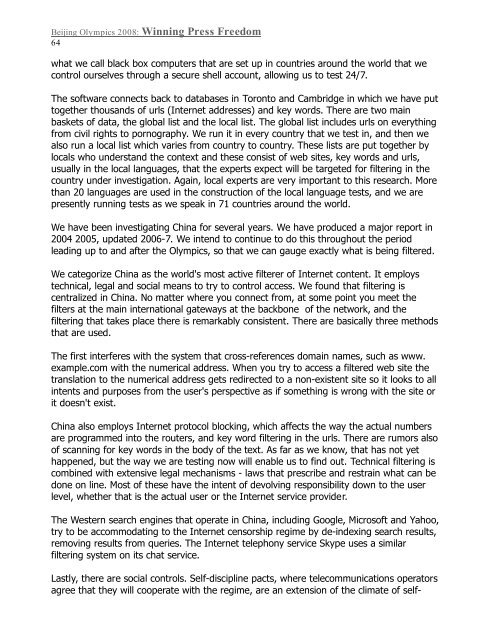Beijing Olympics 2008: Winning Press Freedom - World Press ...
Beijing Olympics 2008: Winning Press Freedom - World Press ...
Beijing Olympics 2008: Winning Press Freedom - World Press ...
Create successful ePaper yourself
Turn your PDF publications into a flip-book with our unique Google optimized e-Paper software.
<strong>Beijing</strong> <strong>Olympics</strong> <strong>2008</strong>: <strong>Winning</strong> <strong>Press</strong> <strong>Freedom</strong><br />
64<br />
what we call black box computers that are set up in countries around the world that we<br />
control ourselves through a secure shell account, allowing us to test 24/7.<br />
The software connects back to databases in Toronto and Cambridge in which we have put<br />
together thousands of urls (Internet addresses) and key words. There are two main<br />
baskets of data, the global list and the local list. The global list includes urls on everything<br />
from civil rights to pornography. We run it in every country that we test in, and then we<br />
also run a local list which varies from country to country. These lists are put together by<br />
locals who understand the context and these consist of web sites, key words and urls,<br />
usually in the local languages, that the experts expect will be targeted for filtering in the<br />
country under investigation. Again, local experts are very important to this research. More<br />
than 20 languages are used in the construction of the local language tests, and we are<br />
presently running tests as we speak in 71 countries around the world.<br />
We have been investigating China for several years. We have produced a major report in<br />
2004 2005, updated 2006-7. We intend to continue to do this throughout the period<br />
leading up to and after the <strong>Olympics</strong>, so that we can gauge exactly what is being filtered.<br />
We categorize China as the world's most active filterer of Internet content. It employs<br />
technical, legal and social means to try to control access. We found that filtering is<br />
centralized in China. No matter where you connect from, at some point you meet the<br />
filters at the main international gateways at the backbone of the network, and the<br />
filtering that takes place there is remarkably consistent. There are basically three methods<br />
that are used.<br />
The first interferes with the system that cross-references domain names, such as www.<br />
example.com with the numerical address. When you try to access a filtered web site the<br />
translation to the numerical address gets redirected to a non-existent site so it looks to all<br />
intents and purposes from the user's perspective as if something is wrong with the site or<br />
it doesn't exist.<br />
China also employs Internet protocol blocking, which affects the way the actual numbers<br />
are programmed into the routers, and key word filtering in the urls. There are rumors also<br />
of scanning for key words in the body of the text. As far as we know, that has not yet<br />
happened, but the way we are testing now will enable us to find out. Technical filtering is<br />
combined with extensive legal mechanisms - laws that prescribe and restrain what can be<br />
done on line. Most of these have the intent of devolving responsibility down to the user<br />
level, whether that is the actual user or the Internet service provider.<br />
The Western search engines that operate in China, including Google, Microsoft and Yahoo,<br />
try to be accommodating to the Internet censorship regime by de-indexing search results,<br />
removing results from queries. The Internet telephony service Skype uses a similar<br />
filtering system on its chat service.<br />
Lastly, there are social controls. Self-discipline pacts, where telecommunications operators<br />
agree that they will cooperate with the regime, are an extension of the climate of self-





